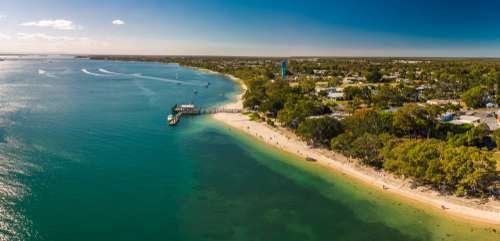Are you making this dangerous mistake at the beach? See how thousands are risking their lives with 4WDs!
By
Danielle F.
- Replies 3
As Australians, we're blessed with some of the most beautiful beaches in the world, and for many of us, driving a 4WD along the shore is a quintessential Aussie experience. However, this beloved pastime can quickly turn perilous when drivers abandon the common sense that's second nature on the road. It's a growing concern that's prompting urgent warnings: reckless beach driving isn't just 'harmless fun' – it's a life-threatening risk.
Recently, a scene at Mermaid Lagoon on Queensland's Bribie Island has reignited the debate over beach driving etiquette. A photo circulated on social media showing a group of beachgoers engaging in what can only be described as a 'reckless' act. At least five 4WD vehicles were parked on the sand, with people sitting on the windscreen and bonnet, and one standing through an open sunroof. While the vehicles were stationary when the photo was taken, it was reported that they had been moving just moments before, with passengers in precarious positions.
This 'stunt' has drawn a mixed response online. Some defend the actions as simply 'having fun', reminiscent of a less regulated past where such behaviour was more common. However, others are quick to point out the potential consequences of such carelessness. 'It's all 'harmless fun' until the car rolls, kids get killed or [suffer] life-changing injuries and families get destroyed,' one commenter rightly pointed out. The fear is that the irresponsible behaviour of a few could lead to a blanket ban on beach driving, punishing the many who do follow the rules.
The gravity of this issue was tragically underscored by the death of 18-year-old Harry Payne in 2021. Harry was killed in a crash on Woorim Beach, another spot on Bribie Island, after a joyride with friends turned fatal. The driver was reportedly speeding at up to 100 kilometres per hour in a 30km/h zone when Harry was ejected from the vehicle and killed instantly. This heartbreaking event serves as a stark reminder that the exhilaration of beach driving must be tempered with responsibility.
In the wake of her son's death, Kylie Payne, Harry's mother, launched the Harry Payne Initiative to promote safety on and off the road. She emphasizes that while beach driving is a cherished activity, it must be done sensibly. 'I don't think that's the answer,' she said, referring to potential bans. Instead, she advocates for more training and awareness for drivers of all ages.
The police also have tips for safe beach driving, which include slowing down around parked vehicles, being aware of hazards such as exposed rocks and holes, and adhering to the law by ensuring all passengers are inside the vehicle and wearing seatbelts when moving. They also caution against driving too fast, while tired, or under the influence.
Our beaches are a national treasure, and the freedom to enjoy them should not be taken for granted. As members of the Seniors Discount Club, we have a responsibility to set an example for younger generations. Let's enjoy our beach drives, but let's do so with the utmost care and respect for the safety of ourselves, our loved ones, and our fellow beachgoers.

We'd love to hear your thoughts and experiences on beach driving. Have you witnessed reckless behaviour on the sands? Or do you have tips for safe and enjoyable beach driving? Share your stories in the comments below, and let's work together to keep our beaches safe and accessible for all.
Recently, a scene at Mermaid Lagoon on Queensland's Bribie Island has reignited the debate over beach driving etiquette. A photo circulated on social media showing a group of beachgoers engaging in what can only be described as a 'reckless' act. At least five 4WD vehicles were parked on the sand, with people sitting on the windscreen and bonnet, and one standing through an open sunroof. While the vehicles were stationary when the photo was taken, it was reported that they had been moving just moments before, with passengers in precarious positions.
This 'stunt' has drawn a mixed response online. Some defend the actions as simply 'having fun', reminiscent of a less regulated past where such behaviour was more common. However, others are quick to point out the potential consequences of such carelessness. 'It's all 'harmless fun' until the car rolls, kids get killed or [suffer] life-changing injuries and families get destroyed,' one commenter rightly pointed out. The fear is that the irresponsible behaviour of a few could lead to a blanket ban on beach driving, punishing the many who do follow the rules.
The gravity of this issue was tragically underscored by the death of 18-year-old Harry Payne in 2021. Harry was killed in a crash on Woorim Beach, another spot on Bribie Island, after a joyride with friends turned fatal. The driver was reportedly speeding at up to 100 kilometres per hour in a 30km/h zone when Harry was ejected from the vehicle and killed instantly. This heartbreaking event serves as a stark reminder that the exhilaration of beach driving must be tempered with responsibility.
In the wake of her son's death, Kylie Payne, Harry's mother, launched the Harry Payne Initiative to promote safety on and off the road. She emphasizes that while beach driving is a cherished activity, it must be done sensibly. 'I don't think that's the answer,' she said, referring to potential bans. Instead, she advocates for more training and awareness for drivers of all ages.
The police also have tips for safe beach driving, which include slowing down around parked vehicles, being aware of hazards such as exposed rocks and holes, and adhering to the law by ensuring all passengers are inside the vehicle and wearing seatbelts when moving. They also caution against driving too fast, while tired, or under the influence.
Our beaches are a national treasure, and the freedom to enjoy them should not be taken for granted. As members of the Seniors Discount Club, we have a responsibility to set an example for younger generations. Let's enjoy our beach drives, but let's do so with the utmost care and respect for the safety of ourselves, our loved ones, and our fellow beachgoers.
Key Takeaways
- Reckless behaviour and dangerous driving by 4WD users at beach locations like Queensland's Bribie Island have raised concerns among locals and authorities.
- A specific incident of irresponsible conduct, where individuals were seen sitting on the windscreen and bonnet of a moving vehicle, has been called out on social media.
- The tragic death of Harry Payne, an 18-year-old who was killed in a crash on Woorim Beach, serves as a poignant reminder of the potential consequences of such reckless behaviour.
- Police and safety advocates urge 4WD drivers to abide by road rules on the beach, emphasizing the importance of driving sensibly, being aware of potential hazards, and using seatbelts.








